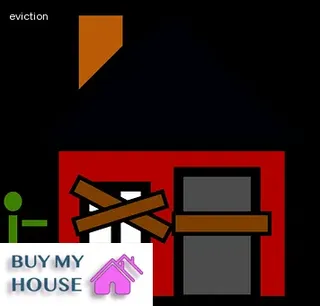Navigating Connecticut's eviction process can be complicated, and the length of time it takes to complete the process varies depending on a range of factors. Generally speaking, an eviction in CT begins with a landlord giving written notice to the tenant to vacate their residence.
The tenant then has either three days or 14 days, depending on the reason for eviction, to respond to the notice before the landlord can file a complaint with their local court. The court will then issue a summons that must be served on the tenant, which marks the beginning of the legal proceedings.
Once served, the tenant has five days to respond by filing an answer in court. If no answer is received within this timeframe, the landlord may then apply for a default judgment from the court.
Once granted by a judge, the landlord may legally evict their tenant from their residence within 10 days of receiving judgment.

When it comes to navigating Connecticut's eviction process, understanding the Notice to Quit is an important first step. This document serves as a formal demand for a tenant to either pay the rent or vacate the property within a certain amount of time, depending on the type of tenancy.
The law requires that landlords provide tenants with at least a 3-day Notice to Quit to pay rent or vacate, while other notices must be given at least 14 days before eviction can occur. Furthermore, if a tenant fails to comply with the notice, their landlord has the option to file an Unlawful Detainer suit in court and ask for a judgment of possession.
It is important for tenants and landlords alike to understand all aspects of Connecticut's eviction process, including Notices to Quit and their associated timelines.
Before taking the steps to evict a tenant from their rental property in Connecticut, there are several key considerations that should be taken into account. First, landlords must be sure that they are following all the state laws regarding eviction and serve their tenant with a proper Notice to Quit.
This notice must include specific language and information, as outlined by the state of Connecticut. It is important to note that different types of leases require different notices and it is vital to use the correct one for your situation.
In addition, landlords should make sure they are familiar with how much time a tenant has to respond after being served with a Notice to Quit. Serving this notice is the first step in the eviction process and understanding these regulations beforehand can help ensure that everything runs smoothly.

Before a landlord can begin the formal eviction process in Connecticut, they must first serve the tenant with a notice informing them of their violation of the lease agreement. This is referred to as Service of Notice, and it is the first step in the eviction process.
The Service of Notice should include a specific description of the violation and an explanation that if the tenant does not remedy or vacate within a certain number of days (for example, 3 days for non-payment of rent), then the landlord may proceed with an eviction action. In Connecticut, landlords must also provide tenants with information on how to contact legal assistance or other organizations that can help them during this process.
It is important for landlords to keep records establishing that they have served their tenants with Service of Notice properly; this includes proof that they gave it to an adult at the rental property and mailing it via certified mail. Once Service of Notice has been served accurately, landlords can then file an eviction lawsuit in court.
Navigating Connecticut's court system for summons and complaint in the event of an eviction is a necessary step to ensure that the rights of all parties involved are protected. To begin, a landlord must file a written request for eviction with their local court clerk, including any supporting documents like a copy of the lease agreement, proof of payment and/or notices.
Within 10 days of filing, the clerk will issue a summons to both the tenant and landlord which includes information about the case and how to respond. The tenant has 12 days from receiving the summons to file an answer with the court or request a hearing; if no response is received within 12 days, the landlord can submit a request for default judgment in their favor.
The judge will then review all evidence submitted by both sides before making a decision on whether or not to grant an eviction order. Depending on circumstances such as complexity of the case and availability of judges, this process can be completed within two months or more.

Navigating Connecticut's eviction process is a complex process, and understanding how long it takes to complete can be daunting. In some cases, tenants and landlords may find it necessary to resolve disputes through trial or mediation.
Before the trial process begins, tenants must receive a written notice from their landlord indicating the reason for eviction. The tenant then has three days to respond with an answer to the court.
Depending on the underlying cause of the dispute, if an agreement cannot be reached between both parties after mediation, then a trial will begin. During this time, both parties present evidence in court that supports their case and a judge will make a final decision on whether or not to evict the tenant.
It is important to note that this process can take several weeks or even months depending on how quickly the dispute is resolved.
When a landlord has obtained an Order of Execution, they must follow certain steps in order to go through with the eviction process. This includes filing a writ of execution with the court, which is a document that authorizes a court officer to forcibly evict tenants from their residence.
Then, they must serve notice to the tenant informing them of their eviction date, as well as providing information about any other legal remedies available. After this, the tenant must be formally evicted by a court officer and all belongings must be collected if necessary.
Finally, the landlord can then take possession of the property and terminate the tenancy agreement. Throughout this process, there are many legal requirements that need to be followed in order for it to move forward properly and quickly.

Navigating Connecticut's eviction process can be a complex and time-consuming endeavor. When attempting to calculate an estimate of how long the eviction process will take, it is important to consider all aspects of the procedure, including filing the court paperwork, serving notices, scheduling hearings, and waiting for a judge's ruling.
The timeline for each step of the process can vary depending on the specifics of the case, but typically begins with filing a complaint in court. After this has been done, tenants are served with various written notices informing them of their rights and obligations under Connecticut law.
From there, landlords must wait for a hearing date to be set by the court and all parties must appear at this hearing. Ultimately, a judge will make a decision about whether or not to grant an eviction order – this could take anywhere from one day to several weeks or months depending on the complexity of proceedings.
Navigating Connecticut's eviction process can be a difficult and time-consuming endeavor. There are many potential risks and challenges associated with evictions, such as the possibility of court delays, financial costs, legal issues, or even homelessness.
Depending on the situation, cases can take anywhere from weeks to months to resolve. If a tenant is unable to pay rent or other fees due to factors beyond their control, they may face an additional challenge in proving their case in court.
Additionally, if a tenant contests the eviction they may face further delays while waiting for the judge’s decision. On top of this, tenants may also have difficulty finding new housing due to their eviction record.
Finally, landlords can use intimidation tactics in order to push tenants out of their homes without going through formal channels, leaving tenants feeling helpless and desperate for a resolution.

Navigating Connecticut's eviction process can have a significant impact on both a tenant's credit score and their rights as a tenant. For tenants in Connecticut, understanding the eviction process and how long it takes is important in order to protect their financial situation and ensure they are being treated fairly.
When an eviction lawsuit is filed, the tenant must be served with an eviction notice, giving them an opportunity to respond to the complaint. After the court has processed the initial paperwork, a hearing will be set for the landlord and tenant to present their arguments before a judge.
If the landlord wins the case, then a writ of possession is issued which grants them full rights to repossess the property within five days of issuance. The entire process can take anywhere from two months up to several months depending on factors such as availability of court dates and if any appeals are made by either party.
A successful eviction can remain on someone's credit report for up to seven years and make it difficult for them to obtain future housing or obtain financing. Tenants should also familiarize themselves with federal and state laws that govern evictions in order to ensure they are not being taken advantage of during this process.
When navigating Connecticut's eviction process, one of the most important steps is preparing legal documents. It is important to understand that landlords must follow certain rules and regulations when evicting a tenant.
The first step is to serve the tenant with a written notice that outlines why they are being evicted and how much time they have left to move out. This notice must be served in accordance with Connecticut law, which states that landlords must provide at least 14 days' notice before filing an eviction case in court.
The landlord should also prepare a written complaint for the court and attach any relevant notices or documents, such as rental agreements or receipts. Additionally, landlords may need to serve copies of these documents to the tenant or their attorney.
Finally, landlords should make sure all forms are properly filled out and filed with the court prior to the hearing date in order to ensure their case is heard in a timely manner.

Connecticut offers resources to help low-income tenants facing eviction. Legal assistance is available through the Connecticut Bar Association, which provides free legal advice and referrals to Connecticut residents with financial hardship.
Additionally, non-profit organizations like the Connecticut Fair Housing Center provide a range of services to tenants in need, including legal representation and access to housing resources. For those who need additional support, there are various community groups and programs that offer education on tenant rights, crisis intervention services, and assistance with finding alternative living arrangements.
It is important for tenants to know their rights under Connecticut law when facing eviction so they can make informed decisions about their housing situation.
Navigating Connecticut's eviction process can be a daunting and time-consuming task, but potential solutions exist to avoid or simplify the process. Homeowners in Connecticut can take advantage of sources like the Tenant Rights Handbook and legal advice hotlines to ensure their rights are protected when dealing with an eviction.
Additionally, tenants facing eviction can explore mediation services which provide a platform for both parties to reach an agreement while keeping court costs low. Working out a repayment plan with your landlord can be another beneficial solution as it allows the tenant to pay off any debt over time, instead of being evicted immediately.
Lastly, tenants may consider obtaining housing assistance from organizations like United Way that offer subsidies and other programs dedicated to helping those at risk of eviction. Taking advantage of these resources may help reduce the amount of time it takes to navigate Connecticut's eviction process.

Many individuals facing eviction in Connecticut are unaware that there are alternatives to the traditional eviction process. Before beginning the eviction process, tenants should consider communicating with their landlords and exploring options such as payment plans, mediation services, and lease extensions.
If a tenant is unable to pay rent due to extenuating circumstances such as job loss or medical bills, they may be able to discuss reduced rent payments or a temporary forbearance with their landlord. This allows both parties to come together to find an agreement that works for everyone involved.
In addition, some rental assistance programs may be available through certain organizations or local government agencies. It is important for tenants to understand that these alternatives are not guaranteed, but worth exploring before jumping into the eviction process which can take weeks or months.
When researching eviction laws in other states, there are several things to consider. Each state's eviction process can vary depending on the particular law and regulations.
In addition to researching the specific details of the law in each state, it is important to understand the differences between civil and criminal eviction proceedings. It is also essential to research any particular nuances that may be applicable in a particular jurisdiction.
Additionally, understanding the different types of leases, such as month-to-month or fixed term tenancy agreements, will help inform an individual's rights and responsibilities according to their agreement with a landlord. Finally, researching filing fees and timelines for each state's eviction process can help someone prepare for navigating their own eviction situation if necessary.

Hiring an experienced lawyer to navigate Connecticut's eviction process can be beneficial in more ways than one. An experienced lawyer is familiar with the laws and regulations regarding evictions in the state, which can help tenants understand their rights and what they can do to protect themselves.
An experienced lawyer can also make sure that all paperwork is properly completed and filed, so tenants don't risk having their cases dismissed due to technicalities or other errors. A lawyer can also provide valuable advice on strategies for negotiating with landlords, as well as developing a plan of action if the case goes to court.
Lastly, an experienced attorney will be able to represent tenants in court proceedings, ensuring that their side of the story is heard and that they receive a fair judgment.
CTLawHelp is a great resource for landlords and tenants in Connecticut who are navigating the eviction process. Their website provides comprehensive information on landlord-tenant laws, including which steps must be taken to complete the eviction process and how long the average eviction takes.
Additionally, they offer specific advice tailored to landlords and tenants alike, designed to help them understand their rights under Connecticut law. CTLawHelp also provides free legal assistance to eligible tenants in certain situations, such as those facing evictions due to financial hardship or failure to pay rent.
With this in-depth knowledge of the current state of law and helpful guidance, CTLawHelp has become an invaluable asset for anyone dealing with landlord-tenant issues in Connecticut.

Navigating Connecticut's eviction process can be a challenging task, and understanding local laws and regulations on leasing property is key to the process. Knowing the relevant state statutes and any applicable city or county ordinances is essential in order to comply with all legal requirements.
Landlords should also be aware of their rights and responsibilities under the law; for example, they must provide tenants with at least 30 days’ notice for most non-payment evictions. Additionally, landlords have certain duties in regards to maintenance of rental properties, such as making necessary repairs in a timely manner.
It's important to understand that some municipalities may have additional restrictions on rental units that may not apply elsewhere in the state. Ultimately, it's important to know all of the local laws before entering into a lease agreement so that both parties are protected under Connecticut law.
Filing an eviction suit in Connecticut is a lengthy process with significant financial implications. The filing fee alone can range from $30-$150 depending on the county, plus additional fees for service of process, court costs and other administrative costs.
If the tenant contests the eviction in court, the landlord may be required to pay attorney's fees as well. The process also entails potentially costly delays; if an eviction suit is filed in Connecticut, it can take anywhere from 2-3 weeks to several months for a hearing to take place and a decision to be rendered.
Even if the landlord prevails in court, any costs associated with filing an eviction suit are out of pocket expenses that must be borne by them.

It is important for both landlords and tenants to be aware of best practices during the process of an eviction in Connecticut. Landlords should not attempt to evict a tenant without first providing proper notice, as this can potentially lead to legal action.
Tenants should also ensure that they are in compliance with their lease agreement and follow any directives from their landlord regarding the eviction. In addition, both landlords and tenants should be aware of their rights under the law, including the right to file a complaint with the Connecticut Department of Housing if they feel they have been wrongfully evicted or are facing unfair treatment due to a discriminatory practice.
Furthermore, both parties should review all documents related to the eviction process carefully and make sure all deadlines established by the court are met. Finally, it is important for both parties to understand how long an eviction typically takes in Connecticut as this can help them plan accordingly.
Navigating Connecticut's eviction process can be a complicated endeavor for landlords. To successfully evict a tenant in CT, it is important for landlords to understand the timeline of the eviction process and how long it typically takes.
Evictions in CT must go through a court-based process which can take up to two months or longer depending on the complexity of the situation. Following notification of the tenant that they are being evicted, there is a 14-day waiting period until a hearing can be held with a judge.
The hearing is used to determine if the landlord has enough cause to legally evict their tenant; if so, then an Execution for Possession will be issued by the court after another 14 days. Once this document has been issued, landlords can begin eviction proceedings with their local police department.
An officer must then serve an official notice to vacate to the tenant informing them that they have 72 hours to move out or face further legal action. It should also be noted that tenants may appeal any ruling made during their initial hearing, adding additional time onto the eviction process.
Ultimately, navigating Connecticut's eviction process and understanding how long it takes is essential for landlords looking to remove tenants from their property quickly and efficiently.

Evicting a tenant in Connecticut is not an easy process. It requires the landlord to file a notice of termination with their local court, which must be done by certified mail or delivered in person.
The notice must inform the tenant of their rights and the steps they need to take to contest the eviction. Once this step is completed, the landlord must file a complaint with the court, which will then hold a hearing on the matter.
Depending on how many tenants are involved and how quickly they respond, it can take anywhere from several weeks to months for a judge to make a decision. Landlords should also be aware that there are specific laws in Connecticut that protect tenants from unfair evictions, so it's important for them to familiarize themselves with these laws before proceeding.
If you are facing an eviction in Connecticut, it is important to understand the steps required for a successful delay of your eviction. The Connecticut Landlord-Tenant Law outlines the process for landlords and tenants when it comes to evictions.
Generally, a landlord must provide written notice to their tenant that they must vacate before filing an eviction lawsuit. Once the lawsuit is filed, it typically takes four to twelve weeks from start to finish before an eviction order is granted by the court.
However, there are steps that can be taken by tenants to delay an eviction in CT, allowing them more time to find alternate housing or negotiate with their landlord. These steps include responding promptly to any notices or summons sent by their landlord's attorney and attending all court hearings related to their case.
Additionally, tenants can attempt to negotiate with their landlord or enter into mediation services offered by the court system in order to resolve any disputes without litigation. Although the timeline of an eviction will vary depending on individual circumstances, understanding how to delay an eviction in CT can be beneficial for both landlords and tenants alike.
When navigating Connecticut's eviction process, it's important to understand the potential consequences of being evicted. In Connecticut, a landlord can legally evict a tenant for failure to pay rent or for violating the terms of the lease agreement.
Once an eviction is finalized, it will remain on your record for up to seven years. During this time, landlords may deny you rental applications based on your prior eviction, making it difficult to secure future housing in the state.
Additionally, because an eviction can negatively affect your credit score, you may find yourself unable to obtain financing or other financial services that require a credit check. Therefore, understanding how long an eviction remains on your record in Connecticut is essential when considering filing for eviction or defending against one.